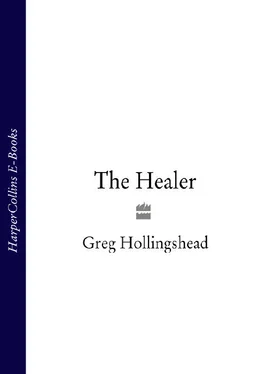1 ...6 7 8 10 11 12 ...17 “It was suds that came back out the drain where the washer empties, right next to the clothesbasket. I didn’t notice them against the light-coloured lino, there. I had my eyes on the clothes dropping. Well, the air pushed out by the clothes as they landed was passing through the mesh of the basket and popping the suds. It was the suds popping I was hearing, and it sounded almost electric but not really.”
“Well, well,” he said.
She looked up at him. “It didn’t sound like suds when they pop. I know what suds popping sounds like. Or I thought I did. This was more crackly. I was thinking I was hearing something electric, so it wasn’t the same sound.”
“Not the same sound, no,” he said.
She was looking up at him in an attitude of imploring, but that was not what she was doing. The look was to say that this was for him. For his benefit. That she knew what she knew, fugitive and inconsequential and perhaps dreary or trivial to another as it might be, but it didn’t matter, because she also knew that it would operate to the degree of its significance, and if it were not significant, then it would not last, it would make no difference, it would not operate at all.
“It was like eating a cherry,” she said, “when you think you’re eating a grape. It’s not the same as eating a cherry when you’re expecting a cherry. It’s a strange cherry.”
“You’re a strange cherry,” he said. “A strange cherry with too little on her mind.”
And then she seemed to have to will herself to continue. For a long time now it had been difficult for her to talk to him at all, let alone about anything that mattered to her. This was hard work, and the only thing that made it possible at all was how much it did matter to her. “I’m not saying everything’s in a person’s mind or that nothing’s ever the same the next time, I’m saying a person can be wide open to how much it is and it isn’t the same the next time. You don’t have to hold on to believing things are a certain way any more than you have to act according to some idea of what you should do. It’s only going to wear you down. Well, today I stopped. All that’s gone, I let it go, and it doesn’t matter, or maybe it’s the only thing to do. The energy’s back, it’s gathering. It turns out it never stopped. And I’m still here. I’m saying it’s not the end of the world.”
She had lowered her head and was scraping at the dirt with the barrel of the gun. Now she looked up. “Or maybe it is the end. But if it is, it’s the beginning too. Every moment.”
His face was averted. “I thought you said you were dry,” he murmured.
“Not any more.”
Now he came down beside her, squatting too. Her head was bowed again. He looked to the west, where the sun was making a blaze out of a new tin roof on the other side of the sunken highway. If there was more to say about the bubbles, she didn’t say it, only went on scraping with the gun. He looked back at her, at the top of her head.
“Whew,” he said. “For a moment there I thought you were going to tell me you saw God in the suds. Fell to your knees and licked out the drain.”
She rose up off her haunches and started for the truck. He came after her and placed a hand on her arm, and she turned with the gun in both hands and raised it until the end of the barrel came up to the point directly in the centre of his chest.
“Don’t ever, ever do this,” he said.
“I know what happened,” she said. “But I don’t understand what it’s done to me. It’s obvious it’s done something, and then there’s all this energy, and it’s not ordinary, it’s not like any other kind. I don’t know what’s happening, I have no idea, and I don’t want to pretend to myself that I do. I need to find out so I can know what to do next. Not just the next thing, but what needs to be done. It’s like there’s been a disaster to the land. The question is, What’s growing here now?”
“Lower the gun.”
She did not lower the gun.
He took a breath. Exhaled. At that moment he too must have recognized the extraordinariness of her talking to him, for he seemed to resolve to go along. He rocked back on his heels. “So what is? Growing here now?”
“I’m telling you I don’t know. I have to find out for myself.”
“Nothing new about that. ‘Caro’ine do it by se’f.’ That’s your problem.”
“Then I’ll find that out too. Why aren’t I allowed to know what I can know? Why can’t a person know a thing unless everybody else is right there to say, ‘Okay, fine, we’re all ready, you can go ahead and know that now.’ What if other people haven’t had the same kinds of things happen to them? Good or bad, I’m not talking about only bad—”
“People keep each other on track. That’s how they move ahead. This is the problem since you quit school.”
“I quit school because I wasn’t learning anything in school.”
“You’re learning now? What? How special you are? The powers available to the true believer?”
“What do I believe?” she cried. “Tell me what I believe! Tell me right now!”
He ignored this. “And you quit healing because you couldn’t—what? Deserve it? Or heal?”
“It’s the energy heals,” she said. “The energy’s got nothing to do with deserving or not deserving.”
“Of course it does. Whatever you happen to think about it. You just don’t want to see your own part in this. In anything. Nothing new about that either. Look, Caroline. Anybody can be a saint if they never leave their own room. At least when you were laying hands on people you were getting out of the house. You’re too old for this. You’re too smart. It’s time to come back to reality. It’s time to remember who you are.”
She lowered the gun. “Who I am is fog,” she said. “Who I am is poison gas.”
He looked at her, and then he performed one of his unexpected acts. Brought his hands up to press the heels against his eyes. For a full minute he stood like that, still facing her, heels pressing, and then he took them away and his eyes were red and hollow and wet. He blinked. “Just don’t leave me, Precious Angel,” he said in a soft voice, almost a lisp. “I’m begging you. Don’t do it.”
She watched him as he said this. And then she said, “This isn’t begging, it’s warning.”
She turned and walked back to the truck.
When Ross Troyer spoke in the kitchen his voice caused the heat duct that fed his daughter’s room overhead to resonate. Caroline would know her parents were arguing by the quality of the sound from the duct. Her father did not have to raise his voice, all he had to do was speak long enough each time for the duct to resonate. She would know he was not talking on the phone because the phone was directly below her bed, in the front sitting room, next to her mother’s hand. She would know her parents were arguing because it was only when they argued that her father addressed more than one or two words to her mother at one time. If Caroline were to crouch by the register, as she used to do when she was a child, she could hear what he was saying, and if she were to lie flat on the floor and press her ear to the register, as she used to do until the burden of knowing came to outweigh the secret strength of it, she could hear as well what her mother was saying, all the way from the front sitting room, which was separated from the kitchen by the dining area, less a room than a space between the kitchen and the front room. There her mother, the dog at her feet, would be watching TV or reading a magazine or doing a crossword puzzle, a tumbler of vermouth on the coffee table in front of her, while in the kitchen her father, who did not drink, would be cleaning his rifle or going through real estate listings, and Caroline would know that he was listening to her mother as he had always listened to her, now listening and now not listening, in a way that to judge from his intermittent responses had done nothing over three decades to diminish the irritating effect of her words. Sooner or later the duct would start to resonate.
Читать дальше











